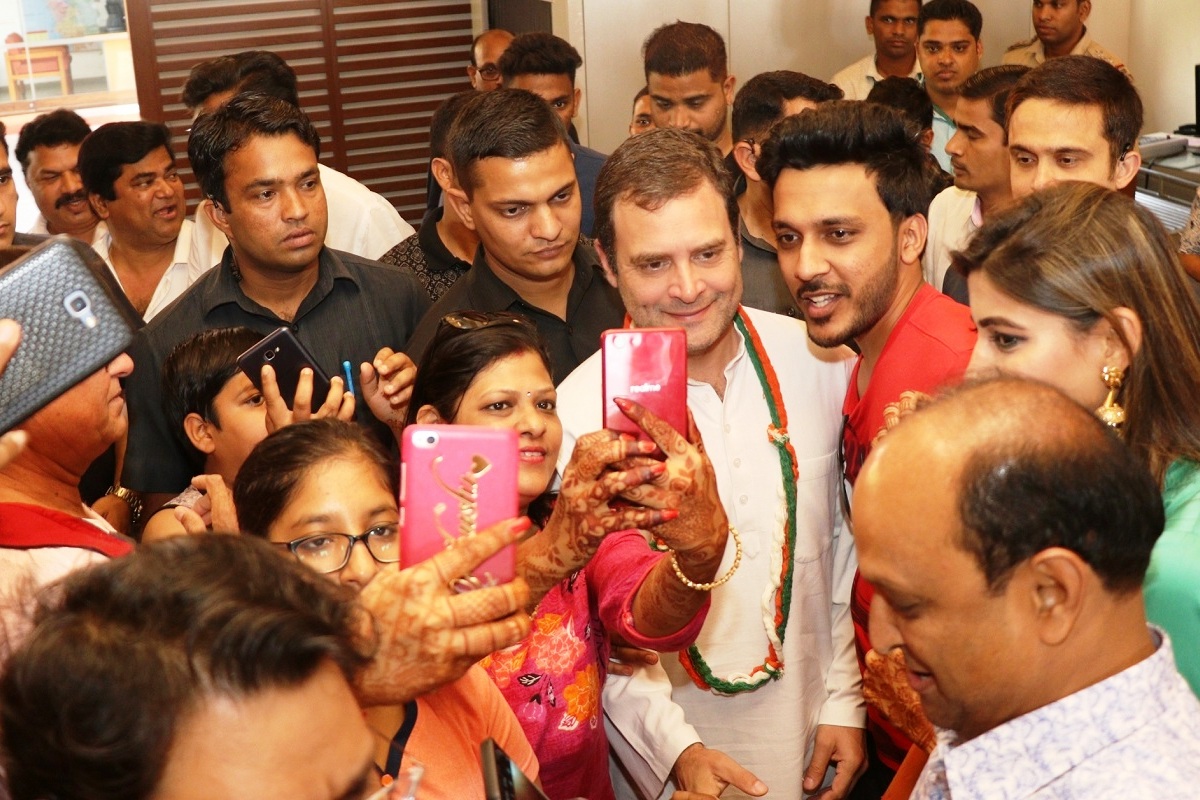Himachal assembly by-polls: Congress announces candidates for 3 seats
The by-polls in six Assembly constituencies in the state are scheduled to be held on June 1 along with the Lok Sabha elections.
According to those present in the meeting, Gandhi answered queries raised by the envoys on domestic, regional and global issues like protectionism, trade issues, Brexit etc. well in a free wheeling discussion that lasted for about three hours.

Tourists click selfie -self portrait - with Congress President Rahul Gandhi at a hotel in Dona Paula, Goa on March 9, 20199. Gandhi was at the hotel to meet the dependents of people who were rendered jobless after ban on mining, fishermen union and other groups. (Photo: IANS)
While the Modi government is trying to use the diplomatic route to mobilise international opinion in favour of India in the aftermath of the Pulwama terror attack and the subsequent Balakot air strike, the Congress party is trying to raise the profile of its president Rahul Gandhi in its own way.
The recent meeting of Gandhi with envoys of the G-20 countries is a classic example of this exercise. Rahul, along with the top brass of the party, had a successful meeting with them with full attendance from the G 20 countries. The ambassadors of Brunei, Dominican Republic and Romania, who head regional groups of ASEAN, GRULAC and Europe, also attended the meet. Pakistan was not invited in view of the present conflict-like situation. “We have covered the entire globe,” claims senior Congress leader Anand Sharma.
Interestingly the Congress had not attempted this kind of exercise in the past though Congress leaders have been interacting with individual envoys. That could be because the party ruled the country for 59 of the 70 years since independence. Neither Indira Gandhi nor Rajiv Gandhi needed this kind of exercise to build up their international image while they were in the opposition. Even Sonia Gandhi, as the Leader of Opposition, did not attempt to do so.
Advertisement
Rahul Gandhi has been trying to boost his image in the international arena since 2017 and more so since he took over as President of the party last year. The promotion of Rahul as a clever young leader endorsed by global intelligentsia was part of the image-making strategy. His Berkeley visit in September 2017 and his interaction with students was a great success. It was indeed a turning point, as it exposed him to a different kind of audience. In Congress circles, there was much joy that their young leader was doing well abroad and was getting positive press. Even the Indian media started paying more attention to Gandhi after his foreign visits.
He followed it up with visits to U.K., Europe, West Asia and other countries. The fact that Gandhi was welcomed by heads of state and business leaders, led to a change in perception both at home and abroad. His meetings in the UK in August 2018 were hailed as a great success as they struck the right notes.
The foreign visits also meant a chance to engage with the Indian Diaspora. Modi has gone out of the way to woo the diaspora wherever he has gone in the past five years. Rahul’s team believes that this engagement would not only lead to a changed perception back home but also lead to the idea that the Congress has a chance to come back. Also the overseas community has a lot of influence in their host countries. Even in Delhi, Rahul has been interacting with individual envoys. The BJP had even accused Gandhi of breaking protocol when he met the Chinese ambassador in the midst of the Doklam standoff between India and China.
Now ahead of the 2019 Lok Sabha polls, Gandhi is continuing his efforts to raise his profile and what better way than to interact with envoys of the G-20 countries and through them to send a message to their respective countries about his leadership qualities? At a lunch he hosted for these envoys (about 30) in a hotel last week, Gandhi shared his economic vision and political thoughts. Pulwama and Balakot also came in for discussion at the meeting and Gandhi explained the Congress stand. Asserting that the Congress stood with the government, he explained how the Congress was the one that had taken the original hard line on national security issues but he had reservations about politicisation of a military response.
According to those present in the meeting, Gandhi answered queries raised by the envoys on domestic, regional and global issues like protectionism, trade issues, Brexit etc. well in a free wheeling discussion that lasted for about three hours. Gandhi himself tweeted about the meeting later, “ I enjoyed the exchange of perspectives & ideas & look forward to continuing our dialogue,”
What is the purpose of such meetings? Apart from exposing him to the international community, the recent interaction showed that Rahul was the only leader capable of challenging Modi in the ensuing polls. He was trying to impress upon the envoys that he was ready to take on the leading role.
Secondly, a good image abroad would also help Rahul at home. Such interactions with foreign envoys would send a good signal as they would see the change for themselves. The Congress would like these envoys to send back good feedback about the meeting and about Rahul Gandhi.
For envoys to meet opposition leaders is par for the course. But the way in which the Congress organised a big meeting has indeed sent a positive signal.
Advertisement